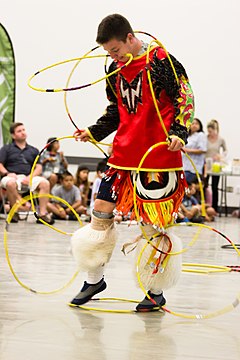National Indigenous Peoples Day
| National Indigenous People's Day | |
|---|---|
 National Aboriginal Day celebrations at University of the Fraser Valley, 2015 | |
| Observed by | Canada |
| Date | 21 June |
| Next time | 21 June 2025 |
| Frequency | annual |
National Indigenous Peoples Day (French: Journée Nationale des Peuples Autochtones; formerly National Aboriginal Day)[1] is a day recognizing and celebrating the cultures and contributions of the First Nations, Inuit, and Métis Indigenous peoples of Canada.[2]
The day was first celebrated in 1996, after it was proclaimed that year by then Governor General of Canada Roméo LeBlanc, to be celebrated annually on 21 June. This date was chosen as the statutory holiday for many reasons, including its cultural significance as the Summer solstice, and the fact that it is a day on which many Indigenous peoples and communities traditionally celebrate their heritage. A proposal to rename the day National Indigenous Peoples Day was made in 2017. The bill to make that change (C-369) was still being debated by parliament when the legislature was dissolved.[3] The federal Crown has begun referring to the day as National Indigenous Peoples Day, regardless.[4]
This day has been celebrated as a statutory territorial holiday in the Northwest Territories since 2001 and in Yukon since 2017. It is not however, currently considered a statutory holiday across the rest of the country.[5]
History
The day came about after a series of calls for such a celebration.[6]
It was first self-declared Indian Day in 1945, by Jules Sioui[7] and chiefs from across North America.[8]
In 1982, the National Indian Brotherhood (now the Assembly of First Nations) called for the creation of a National Aboriginal Solidarity Day to be celebrated on 21 June.[6] In 1990, Quebec became the first province or territory to establish the day as a celebration of Indigenous culture.[9][6]
In 1995, a national conference of Indigenous and non-Indigenous people chaired by Elijah Harper, titled The Sacred Assembly, called for a national holiday to celebrate the contributions of Aboriginal peoples to Canada.[6] In 1996, the Royal Commission on Aboriginal Peoples recommended that a National First Peoples Day be officially recognized.[6] 21 June was chosen as the date because it often coincides with the summer solstice, a time when many Indigenous groups celebrate their culture.[10][2]
In 2001, members of the 14th Legislative Assembly passed the National Aboriginal Day Act making the Northwest Territories the first jurisdiction in Canada to recognise this day as a formal statutory holiday.[11] In 2009, the House of Commons declared June to be National Aboriginal History Month (now National Indigenous History Month).[12]
On 21 June 2017, Canadian Prime Minister Justin Trudeau released a statement pledging to rename the event National Indigenous Peoples Day.[13] Assembly of First Nations National Chief Perry Bellegarde supported the proposed change, called it an "important step," citing the terminology used in the landmark United Nations' Declaration on the Rights of Indigenous Peoples."[13] The private member's bill that would have effected the change in name (Bill C-369) reached first reading in the Senate,[3] but died on the order paper when parliament was dissolved on 11 September 2019. The federal Crown still began using the name National Indigenous People's Day in publications.[4]
In recent years, the Aboriginal Peoples Television Network has broadcast an annual cultural gala, Indigenous Day Live, on National Indigenous Peoples Day.[14]
See also
References
- ^ "Statement by the Prime Minister of Canada on National Aboriginal Day". Prime Minister of Canada. 21 June 2017.
- ^ a b "National Aboriginal Day History" (PDF). Indian and Northern Affairs Canada. Archived from the original (PDF) on 17 November 2017. Retrieved 20 June 2018.
- ^ a b "Private Member's Bill". Parliament of Canada. Retrieved 21 June 2021.
- ^ a b "About National Indigenous Peoples Day". Queen's Printer for Canada. 31 October 2008. Retrieved 21 June 2021.
- ^ "National Indigenous Peoples Day | The Canadian Encyclopedia". www.thecanadianencyclopedia.ca. Retrieved 12 October 2020.
- ^ a b c d e Kudelik, Gail (5 January 2012). "National Indigenous Peoples Day". The Canadian Encyclopedia. Retrieved 11 June 2024.
- ^ Trebilcock, Romola (21 June 2012). "Remembering William Commanda on National Aboriginal Day". rabble.ca.
- ^ Chansonneuve, Deborah. "Happy National Aboriginal Day and Month!" (PDF). FemNorthNet. CRIAW-ICREF.
- ^ issa, Gachi (1 June 2021). "Celebrating National Indigenous History Month". Hamilton Community Legal Clinic. Retrieved 11 June 2024.
- ^ Pitt-Clark, Jenny (19 June 2018). "What, why and how to celebrate National Indigenous Peoples Day". YFile. Retrieved 11 June 2024.
- ^ "National Aboriginal Day". Canada: Government of the Northwest Territories. Archived from the original on 23 June 2016. Retrieved 15 June 2015.
- ^ Schwientek, Samantha (27 June 2023). "June is National Indigenous History Month but how did it come to be?". CBC. Retrieved 10 June 2024.
- ^ a b Harris, Kathleen (21 June 2017). "Trudeau marks National Aboriginal Day with pledge to build relations, rename day". CBC. Retrieved 21 June 2017.
- ^ Charles Lefebvre, "In-person National Indigenous People’s Day celebrations return to Winnipeg this weekend". CTV News Winnipeg, June 16, 2022.
